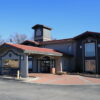By Jakob Cordes, WRIC 8 News
RICHMOND, Va. (WRIC) — Leaking roofs, raw sewage, lead poisoning and extreme temperatures — these were the conditions described by residents of mobile home parks in Richmond and Chesterfield earlier this month.
They spoke at a conference held on April 5 by Richmonders Involved to Strengthen our Communities (RISC), a community faith organization lead by local ministers.
The organization is calling on Richmond and Chesterfield to provide funding for a pilot program to complete much needed repairs through project:HOMES, a local non-profit.
An Overlooked Problem
Sheley Murray, a minister at Southminster Presbyterian in Chesterfield, said they first became aware of the problems after sitting and listening to residents.
“We heard stories having to do with mobile homes,” she said. “People talked about extreme heat, 95 degrees in their mobile home when they had the air conditioning blasting, and the same kind of nightmare in the winter, when the cold was unbearable.”
Murray said many of the homes were built prior to 1976, before there were standards for quality construction.
Residents spoke on stage in front of photos of leaking roofs and windows, with Father Shay Auerbach of Sacred Heart Catholic Church providing translations.
“My children, who were all born here, are frequently sick because of the condition of the trailer we live in,” said Paulina Chavez.
In her home, poorly sealed windows have set off a serious mold problem. Other residents described problems with raw sewage overflows and poor heating.
“We try our best to live in the mobile home, we try to keep the water out – it doesn’t work,” said Alfonso Camira. “My children get sick frequently, including one of my son’s who has become sick because of lead poisoning.”
He added that the city has shut down the park where he lives in the past, but the residents have nowhere else to go, “We don’t really know where to turn to or what to do.”
Part of the problem is that, while newer homes are subject to safety and health regulations, those built before 1976 are grandfathered in under Virginia law, meaning there are no specific standards applied to them.
“Most of these mobile homes were built before 1976, when there were no standards – they are in very bad shape,” Murray said.
“A Vital Form of Affordable Housing”
Most of the residents of Chesterfield and Richmond’s mobile home parks are Hispanic, and many do not speak English, making it difficult for them to advocate for better conditions in the parks.
The problem is bigger than many might realize, according to Murray. “Six to seven thousand people are living in mobile homes, which is more than live in public housing.”
And demand for the cheap homes is only likely to grow as Richmond shuts down more of its public housing units.
“Manufactured housing is a vital form of affordable housing, and very important throughout the state and the country,” said Phil Storey, an attorney with the Virginia Poverty Law Center. “Unscrupulous landlords have turned them into essentially grey markets of financial exploitation and illegal practices.”
With action unlikely at the state or federal level, it’s often up to local governments to tackle the issues in these com munities.
munities.
Just Getting Started
Although the problems are extensive, RISC and project:Homes are hoping a small investment from Chesterfield and Richmond can help them tackle the dangerous conditions.
“With $600,000 [project:Homes] could establish a pilot program to repair or replace 40 homes over the next year,” said Pastor Don Coleman.
Chesterfield County Supervisor Jim Holland and Richmond City Councilmember Stephanie Lynch were both in attendance on April 5, and Coleman asked both to publicly commit to supporting $300,000 from each locality to support the pilot program.
Lynch said she would introduce a budget amendment to do just that, drawing thunderous applause from the crowd.
Holland was a little more circumspect. The Chesterfield budget was approved on April 6, but on the night of April 5, Holland was more circumspect in his promise to the assembly.
“At this point we’re poised to approve the budget,” he said, adding that he could make “no final commitment” before the board’s meeting the following night.
During the budget hearing the next day, a county official brought up the repair funding.
“I know there’s been some recent discussion of mobile home repairs,” he said.
He noted that while the county didn’t set aside any funds explicitly for the project, there were still funds being set aside for project:Homes, “Up to, I think, a quarter of that can be spent on that particular line item.”
With a total of $640,000, that means they could use up to $160,000 for the project.
That falls short of their goal of $600,000 – half of which would have come from the city – but with support from Richmond, the pilot program could still begin this year.
See original story here.





